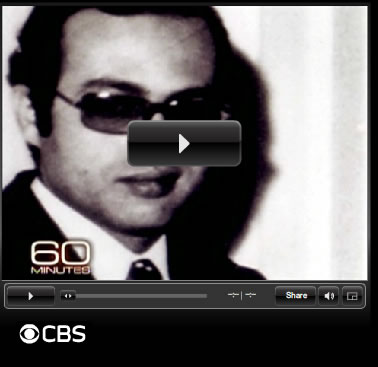60 Minutes: Was Ashraf Marwan Israel's Greatest Spy Or Was He A Double Agent?

Sunday, May 10, 2009
Thirty-five years ago, the armies of Egypt and Syria launched a surprise attack against the state of Israel on Yom Kippur, the holiest day of the Jewish year. Militarily, it ended in a stalemate, but in practical terms the war changed the map and the politics of the Middle East.
At the center of it all is a little known story about one man who played a major role in the outcome. Strangely enough, he's a hero in both Egypt and Israel, considered by each of these former enemies to be their greatest spy ever.
The question is: who was Ashraf Marwan really working for? And who finally murdered him in London?
The first stories in the London papers were sketchy at best: a mysterious Egyptian had been found dead outside his London apartment under questionable circumstances. The name Ashraf Marwan meant nothing to most people in Britain - just another rich Arab who owned hotels and a part of a soccer team.
But to bestselling author Howard Blum, who came across Marwan while writing a book on the Yom Kippur War a few years back, and to students of the Middle East, Marwan was much more: an arms dealer with connections to a half a dozen intelligence agencies and a secret player on the world stage.
"What went through your mind when you found out that Marwan was dead? Did you believe he'd been murdered?" 60 Minutes correspondent Steve Kroft asked Blum.
"Yes, I believed very much that he was murdered. My next question was by whom," he replied.
"And that's a complicated question?" Kroft asked.
"That's a complicated question because Marwan was a complicated man," Blum said.
It's a tale rooted in nearly 40 years of history and a distant war. And as you will see, there are two different versions.
Both of them begin in 1969, not long after the Israelis routed invading Arab armies in the Six Day War, capturing the West Bank from Jordan, the Golan Heights from Syria, and the Sinai Peninsula from the Egyptians.
Another war, to recapture the lost territory, was already brewing when a tall, elegant 26-year-old Egyptian contacted Israeli intelligence in London and offered to provide them his country's most important military secrets.
"It was, for us, something unbelievable," remembered Major General Aharon Farkash, who until recently was Israel's director of military intelligence.
"In our work of intelligence we are very, very suspicious about everything. So we try to ask difficult questions about everything that he brought. And after years we understood this is a piece of gold," Farkash told Kroft.
"In the annals of spies for Israel, where does Marwan rank?" Kroft asked Aharon Levran, who at the time was one of Israel's highest ranking intelligence officers.
"He was the best. He was the best," Levran replied.
Levran was one of only a select few with access to the information that Marwan provided.
"It was a bonanza. It was a masterpiece of information," Levran said.
"Like having somebody?" Kroft asked.
"In the bed of the ruler," Levran replied.
Actually, Marwan was in the bed of the ruler's daughter. He was the son-in-law of Egyptian president Gamal Abdel Nasser, and Nasser's liaison to the Egyptian intelligence services.
"Why do you think he became an Israeli spy?" Kroft asked Levran.
"It was money, it was adventure. He was a special character," he replied.
The meetings took place at a London safe house near the Dorchester Hotel, under the direct supervision of the head of Mossad, the Israeli intelligence service.
According to the Israelis, part of Marwan's motivation was a deep hatred of the Soviet Union, Egypt's major ally, military patron and chief arms supplier. But the Israelis say Marwan also demanded more than $100,000 per meeting to finance what they claim was a lavish London lifestyle that included wine, gambling and women.
"He was for sale," Kroft remarked.
"In a way," Levran acknowledged.
"And Israel paid him very well," Kroft said.
"He was worth every penny," Levran replied.
The Mossad's codename for Marwan was "The Angel," and between 1969 and 1973 he provided the Israelis with reams of secret Egyptian documents. There were transcripts of meetings between President Sadat and Soviet leader Leonid Brezhnev, records of their arms deals, and perhaps most important, detailed Egyptian war plans for recapturing the Sinai Peninsula.
"When Marwan spoke, the highest leaders in Israel within a matter of hours got the transcripts of what he spoke. Golda Meir read them, Moshe Dayan read them. The army chief of staff read them. And this is how they formed their opinions," author Howard Blum explained.
"We were very, very sensitive and aware about early warning of an enemy attack on Israel. From the first day, this was rule number one," Levran told Kroft.
"And you relied on Marwan to give it to you?" Kroft asked.
"Of course," Levran said.
According to the Egyptians, it was Israel's reliance on Marwan to warn them of an impending attack that allowed their army and the Syrians to amass hundreds of thousands of troops on Israel's borders in the fall of 1973, under the guise of a training exercise. In fact, the Yom Kippur War was about to begin, and the Israelis had heard nothing from Marwan.
"Who was Ashraf Marwan working for?" Kroft asked Dr. Abdel Monem Said, one of Egypt's top national security experts.
"He was officially working for the president of Egypt. But also, he was working for the security establishment of Egypt as well," Said told Kroft.
Dr. Said said it was all part of the plan.
Said told Kroft Marwan didn't work for the Israelis. "Not whatsoever," he said.
Egyptian officials refused to talk to 60 Minutes about Marwan on camera because the information is still secret.
But a number of people directed us to Said for the Egyptian side of the story, which is that Israel's greatest spy was actually a double agent.
"Top Israelis told us 'Marwan gave us the best information we have ever gotten from anyone,'" Kroft told Said.
"How you build the confidence in one of the best intelligence services in the world? You give them best information that serve your purpose," he replied.
The Egyptians' purpose was to recapture the Suez Canal and all or part of the 23,000 square miles of the Sinai Peninsula occupied by the Israelis. To do it, they needed to deceive their enemy at a crucial moment, and according to Dr. Said, Marwan was the key element in that deception.
"The Israeli know that there was Egyptians and Syrians on the ground mobilizing their forces. These forces were already in the front. They are taking offensive positions," Said explained. "It's a classic case in the books. You got all the information, but you make the wrong interpretation. And the only variable that is different was Ashraf Marwan."
"We were subjugated to this source, and we put aside information from the observation posts we were dependent on him to give us the last verdict. The last confirmation," Aharon Levran told Kroft.
Marwan finally provided that confirmation at a late-night meeting in London with the head of Mossad, just 12 hours before the fighting began. The Syrians and the Egyptians would attack on two fronts, he said, at 6 p.m. the following day, the holiest day on the Jewish year. The Israelis were totally unprepared. Most of their soldiers were already home with their families.
Continued
